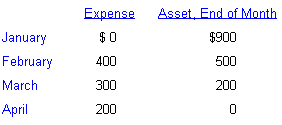Accrued Expenses
There are two types of transactions in which a cash disbursement and the related expense occur in different accounting periods:
- The cash disbursement is made prior to the incurrence of expense. At the time cash is paid out, an asset, Prepaid Expense, is created.
- The cash disbursement is made after the expense is incurred. At the time the expense is incurred, a liability, called Accrued Liability, is created.
Prepaid Expenses
Assume that in January, Computer Solutions paid $900 cash for a supply of fuel oil that it will use in heating its premises for the next several months. In January, Cash decreases by $900 and there is an equal increase in an asset, Fuel Oil Inventory. In January there was no decrease in equity and no expense. The entry for January would be as follows:
|
Dr. Fuel Oil Inventory |
900 |
|
|
Cr. Cash |
900 |
From here on, the abbreviations Dr. and Cr. are used for Debit and Credit.
The expense occurs in the months when the fuel oil is used. Assume that $400 of fuel oil was used in February, $300 in March, and $200 in April. These amounts are expenses in those months, and the Fuel Oil Inventory account decreases by an equal amount. The entry for February follows:
|
Dr. Fuel Oil Expense |
400 |
|
|
Cr. Fuel Oil Inventory |
400 |
Each month you enter a credit to the asset account and a debit to Fuel Oil Expense. The effect on the balance sheet and on the income statement in each month is as follows:

The same principle applies to any asset used in future periods. The purchase of insurance protection creates an asset, Prepaid Insurance. As the insurance protection expires, there is a credit to Prepaid Insurance and a debit to Insurance Expense. The advance payment of rent creates an asset, Prepaid Rent. In the period that the rent covers, there is a credit to Prepaid Rent and a debit to Rent Expense.
Buildings, equipment, furniture and other long-lived assets also become expenses over future periods and are accounted for in essentially the same way as the fuel oil. However, the details for recording long-lived assets are somewhat different and are described later.